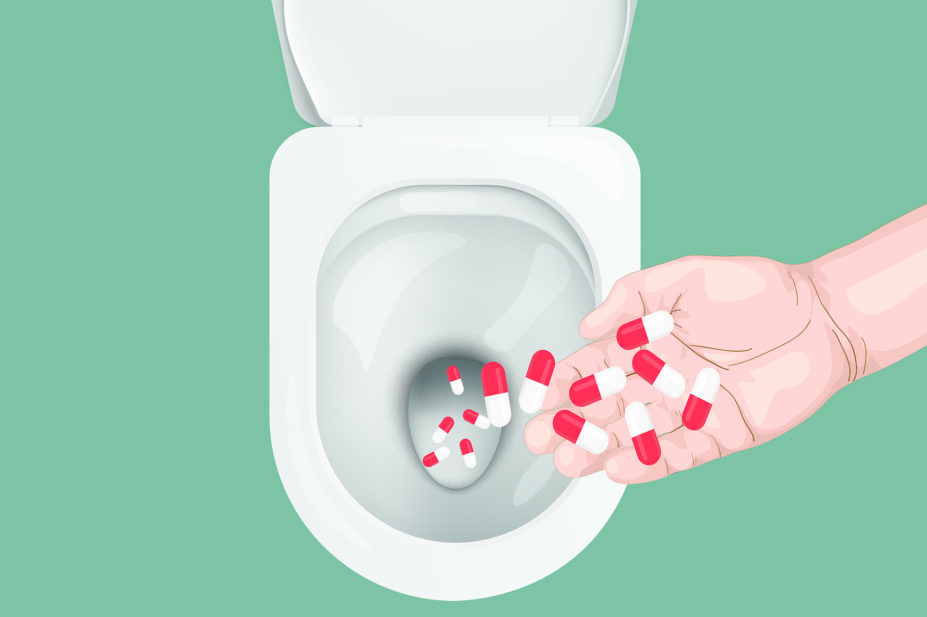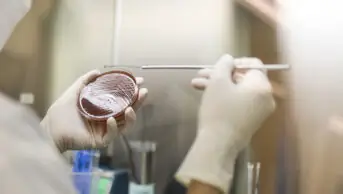
Mclean
Antimicrobial resistance (AMR) is a major health threat, with an article in The Lancet estimating that AMR contributed to the deaths of almost 5 million people around the world in 2019[1]. Tackling this requires a coordinated approach from multiple stakeholders, including government, healthcare, the pharmaceutical industry and wider society.
In the UK, the government has set out a five-year national action plan for 2019 to 2024 to tackle AMR. The plan notes the impact of antimicrobial contamination of the environment on AMR, and that the environment is a pathway for humans to acquire and develop AMR. While the plan identifies potential controls for agriculture, animal husbandry and industry, there is no mention of tackling the unsafe disposal of antimicrobials in domestic sewerage or refuse streams, although there is an ambition to increase public awareness of the hazards and risks of AMR in the environment.
We believe a nationally coordinated antibiotic amnesty could address these issues.
It is clear that promoting the safe disposal of unused antibiotics is critical, yet public awareness of the available means to do this seems to be low. A 2017 household survey in England revealed that, of almost 500 people who had received antibiotics in the previous 12 months, 14% had leftover antibiotics. Of these, almost one third threw them away while only 8% returned them to a pharmacy for safe disposal. Additionally, the survey identified that one third of patients with leftover antibiotics kept them for use at a later date[2].
A recent study of pharmaceutical contamination of 258 rivers identified several antimicrobial agents present at levels significant enough to cause concern
Data cited in a recent report by the Organisation for Economic Co-operation and Development showed that, as of 2006, 63% of medicines in the UK were discarded in household waste and 11% were emptied in the sink or toilet. This has a significant impact on our environment. A study of pharmaceutical contamination of 258 rivers identified several antimicrobial agents present at levels significant enough to cause concern, including detection of trimethoprim in rivers in four out of five continents[3].
One of the largest public and professional awareness campaigns around AMR is World Antimicrobial Awareness Week (WAAW), coordinated in the UK by the UK Health Security Agency. The theme of WAAW 2021 was to ‘Spread awareness, stop resistance’.
Within England’s Midlands region, we organised a public antibiotic amnesty with the help of the clinical commissioning groups’ (CCGs) medicines management and medicines optimisation teams, and with support from the NHS England regional pharmacy team and local pharmaceutical committees to encourage the return of old or unused antibiotics for safe disposal. This ran in community pharmacies on 15–30 November 2021.
Community pharmacies were encouraged to participate via an educational webinar, held as part of WAAW preparations in October 2021, where the amnesty plan was outlined. The amnesty was promoted through a variety of CCG social media channels, websites and in GP surgeries, and the event received coverage in some local newspapers. Pharmacies were provided with posters to print and display to advertise the amnesty during the campaign. While the amnesty was taking place, community pharmacies across the country were also participating in the Pharmacy Quality Scheme (PQS), which includes antimicrobial stewardship objectives, including the use of the TARGET antibiotic checklist when dealing with prescriptions for antibiotics.
Some 239 pharmacies in the Midlands region took part in the amnesty campaign and reported their WAAW activities, recording almost 8,000 conversations about the amnesty on the PharmOutcomes platform. In these pharmacies, 4,600 TARGET checklist consultations were carried out during the campaign, suggesting a good overlap between the campaign and the PQS. In addition, 369 partially used packs of antibiotics and 126 unused full packs were returned. We believe this was a successful campaign, and we are keen to repeat it, while extending its reach and gathering more evidence.
There is increasing recognition that patients are often prescribed excess course lengths of antibiotics[4]. Within primary care, the UK national action plan target is a 25% reduction in the volume of antibiotic prescribing by 2024, compared with a 2013 baseline. Most National Institute for Health and Care Excellence guidance for respiratory tract infection — a common reason for prescribing antibiotics in primary care — now recommends five days of treatment, but seven-day prescriptions comprise the majority[5]. In addition, a recent clinical trial demonstrated that three days of antibiotic treatment for community-acquired pneumonia was non-inferior to seven-day courses in children[6].
’Shorter is better’ is an increasingly common mantra in antimicrobial prescribing
Antibiotic oversupply on discharge from hospital is also a problem[7,8]. Despite imperatives to take antibiotics as prescribed and complete the course of treatment, it is clear that many patients do not do this. Patients may stop taking antibiotics once they feel better and may hoard them for use at a later date, either for themselves or for use by other people[2]. This behaviour, coupled with the reflex behaviour of some prescribers to prescribe in Constantine units (i.e. seven-day periods), may be leading to oversupply of antibiotics and unsafe disposal practices or hoarding[9,10]. ’Shorter is better’ is an increasingly common mantra in antimicrobial prescribing as evidence for equivalence in outcomes for shorter courses of antibiotics accumulates and offers a valid option to safely reduce antibiotic consumption, in addition to reducing waste, expenditure, carbon footprint, environmental contamination and ecological resistance.
Public health campaigns, such as antibiotic amnesties, may raise awareness of the hazards of unsafe disposal and provide a reminder of the appropriate routes of disposal; community pharmacies are ideally placed to help deliver this, being the principal supply route for antibiotics in primary care. A similar campaign in New Zealand encouraged patients to return antibiotics to their community pharmacy.
In England, community pharmacy teams are already incentivised to participate in antimicrobial stewardship as part of the PQS and are contractually required to accept medication returns from patients and the public, so the infrastructure and commitment is present already. The PQS has previously addressed the management of waste, specifically for inhaler disposal, supported by the Pharmaceutical Services Negotiating Committee, who produced a briefing on this. Having a focus on shorter antibiotic courses and an antibiotic amnesty during WAAW would make sense, to link with and capitalise on the intensity of public health messaging during this period.
Pharmacy must not lose sight of this opportunity to remain at the forefront of antimicrobial stewardship and should embrace opportunities to tackle AMR. Community pharmacy teams have already helped to deliver a huge component of the COVID-19 vaccination campaign (more than 22 million doses delivered by January 2022) and are well regarded by the public. Capturing some important metrics during an amnesty to assess the reach and impact, as was done in the Midlands, should be built into any campaign.
However, an antibiotic amnesty campaign does not come without potential drawbacks. Community pharmacies have been subject to severe pressures during the COVID-19 pandemic, and the addition of another public health role may add to that pressure. However, more attention could be placed on prescribing to safely reduce course lengths and avoid leftover antibiotics in the first place to mitigate this.
The term ‘amnesty’ could also be construed as implicating the public in wrongdoing and could undermine confidence in prescribers, whose prescribing practice could have led to the need for an amnesty. However, we believe that if AMR is genuinely one of the greatest threats to human health, then every effort needs to be made to reduce its impact and an annual antibiotic amnesty could play a part in this.
Why stop at community pharmacies in the Midlands? The ‘Antibiotic Amnesty’ campaign provides an opportunity to be more ambitious and seek to capitalise on the increasing recognition of the impact of medicines on the environment, as well as the AMR and ‘Greener NHS’ agendas. We invite all community pharmacies throughout England to participate in the Antibiotic Amnesty campaign during WAAW 2022, which is being held on 18–24 November 2022, and this invitation is extended to pharmacy colleagues in secondary care. We could also consider inviting veterinary practices to accept antibiotic returns from their clients, to create a ‘One Health Antibiotic Amnesty’. Were we to coordinate efforts internationally around WAAW, pharmacy could be at the forefront of this campaign, continuing to lead on public health where medicines are concerned.
All authors are writing in a personal capacity. No authors declared any conflicts of interest when submitting this article.
- 1Murray CJ, Ikuta KS, Sharara F, et al. Global burden of bacterial antimicrobial resistance in 2019: a systematic analysis. The Lancet. 2022;399:629–55. doi:10.1016/s0140-6736(21)02724-0
- 2McNulty CAM, Collin SM, Cooper E, et al. Public understanding and use of antibiotics in England: findings from a household survey in 2017. BMJ Open. 2019;9:e030845. doi:10.1136/bmjopen-2019-030845
- 3Wilkinson JL, Boxall ABA, Kolpin DW, et al. Pharmaceutical pollution of the world’s rivers. Proc. Natl. Acad. Sci. U.S.A. 2022;119. doi:10.1073/pnas.2113947119
- 4Pouwels KB, Hopkins S, Llewelyn MJ, et al. Duration of antibiotic treatment for common infections in English primary care: cross sectional analysis and comparison with guidelines. BMJ. 2019;:l440. doi:10.1136/bmj.l440
- 5Pneumonia (community-acquired): antimicrobial prescribing. National Institute for Health and Care Excellence. 2019.https://www.nice.org.uk/guidance/ng138 (accessed Jul 2022).
- 6Bielicki JA, Stöhr W, Barratt S, et al. Effect of Amoxicillin Dose and Treatment Duration on the Need for Antibiotic Re-treatment in Children With Community-Acquired Pneumonia. JAMA. 2021;326:1713. doi:10.1001/jama.2021.17843
- 7Feller J, Lund BC, Perencevich EN, et al. Post-discharge oral antimicrobial use among hospitalized patients across an integrated national healthcare network. Clinical Microbiology and Infection. 2020;26:327–32. doi:10.1016/j.cmi.2019.09.016
- 8Chavada R, Davey J, O’Connor L, et al. ‘Careful goodbye at the door’: is there role for antimicrobial stewardship interventions for antimicrobial therapy prescribed on hospital discharge? BMC Infect Dis. 2018;18. doi:10.1186/s12879-018-3147-0
- 9Spellberg B. The Maturing Antibiotic Mantra: “Shorter Is Still Better”. Journal of Hospital Medicine 2018;13:361–362.
- 10Wald-Dickler N, Spellberg B. Short-course Antibiotic Therapy—Replacing Constantine Units With “Shorter Is Better”. Clinical Infectious Diseases. 2019;69:1476–9. doi:10.1093/cid/ciy1134
1 comment
You must be logged in to post a comment.



I am sorry to contradict because patients on antibiotic treatment for 5, 7, 10, or longterm are the ones who pollute the environment. All that you need is 3 dose to kill all the bacteria in our body, and no study to prove you need to prolong treatment.
Using antiseptics, antibacterial soap, detergents and shampoo, kill sensitive bugs and help superbug and fungus thrive. Please stop polluting hospitals with plastic bins and expect to solve this problem of polluting environment.